
Dandruff Solutions
Overview:
Dandruff is a common scalp illness that is characterized by flaking and itching. There are several causes of dandruff, including fungal infections, dry skin, and oily skin. Despite the fact that there are numerous over-the-counter and prescription treatments for dandruff, many people still search for herbal and natural remedies to effectively and gently alleviate the symptoms.
Herbal remedies have long been used to address Daniel’s skin and scalp issues, particularly his dandruff. These natural therapies often contain potent ingredients that have anti-inflammatory, antibacterial, and moisturizing properties. These ingredients can help soothe the scalp, reduce flaking, and support the balance of the skin’s microbiome.
Best natural remedies for dandruff:
Herbal oils for dandruff control:
1. Coconut oil:
Dandruff can be effectively treated with coconut oil, which is a well-liked natural cure. Lauric acid, an antibacterial found in coconut oil, may help fight the fungus Malassezia, which is frequently responsible for dandruff. Furthermore, the high fatty acid content of coconut oil hydrates the scalp and lessens flaking and dryness.
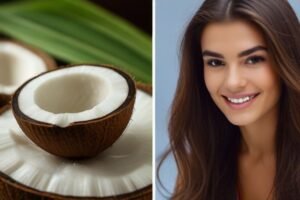
Use coconut oil as a dandruff remedy by doing the following:
Select premium coconut oil: Extra-virgin or virgin coconut oil has more of its health-promoting qualities than processed coconut oil.
Heat the coconut oil: The coconut oil should be warmed gently until it turns liquid. This can be accomplished by either submerging the container in warm water or briefly heating it in the microwave.
Apply to scalp: Part your hair, then use a cotton ball or your fingertips to apply the heated coconut oil directly to your scalp. To guarantee even distribution, use circular motions to massage the oil into your scalp.After completely covering your scalp with coconut oil, keep it on for at least half an hour, or ideally overnight for the best effects.
Shampoo and rinse: Use your regular shampoo routine to get rid of the coconut oil after the necessary amount of time has passed. For complete oil removal, you might need to shampoo twice.
Repeat frequently: Use coconut oil once or twice a week to treat dandruff for optimal effects.
2. Lemon juice:
The acidic qualities of lemon juice assist to balance the pH of the scalp and prevent the growth of fungi that cause dandruff, making it another well-liked natural treatment for dandruff. Furthermore, the antibacterial qualities of lemon juice can aid in minimizing flaking and inflammation of the scalp.
The following is how to apply lemon juice as a dandruff remedy:
Get the mixture ready: To lessen the acidity, squeeze the juice from one lemon and dilute it with the same quantity of water.
Apply straight on scalp: Dab diluted lemon juice onto scalp using cotton ball or fingertips.
Massage in: To make sure the lemon juice reaches every part of your scalp, gently massage it in for a few minutes.
Leave it on: To allow the acids in the lemon juice to do their job, let the liquid stay on your scalp for five to ten minutes.
Rinse out: To get rid of the lemon juice, thoroughly rinse your hair and scalp with lukewarm water.
Shampoo: To clean your scalp and get rid of any leftover lemon juice, wash your hair with a mild shampoo.
Rehydrate: To restore moisture to your hair, use a moisturizing treatment or conditioner.
Repeat as necessary: You can apply this treatment once or twice a week until you feel a difference, depending on the severity of your dandruff.
3. Aloe Vera Gel:
The soothing and moisturizing qualities of aloe Because tea tree oil has antifungal and antibacterial qualities that can help fight off the fungus Malassezia, which is frequently the source of dandruff, it is a well-liked natural treatment for dandruff. This is how to apply tea tree oil as a remedy for dandruff:era gel make it a well-liked natural treatment for dandruff. This is how to treat dandruff with aloe vera gel:
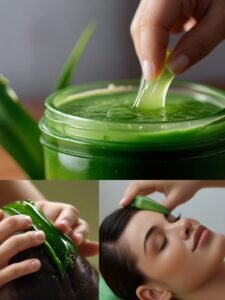 Select pure aloe vera gel:
Select pure aloe vera gel:
For optimal benefits, seek out organic, pure aloe vera gel that hasn’t had any added chemicals or scents. The gel can be purchased from a reliable supplier or extracted straight from an aloe vera plant.
Apply the gel:
Using your fingertips or a cotton ball, part your hair and apply the aloe vera gel straight to your scalp. Apply the gel all over the scalp, paying particular attention to the dandruff-affected regions.
Apply:
Use gentle circular motions to massage the aloe vera gel into your scalp. This promotes equal gel distribution and helps to increase circulation.
Leave it on: Give the aloe vera gel on your scalp a half-hour to an hour’s duration. If you want to stop the gel from dripping, you can cover your hair with a towel or shower cap.
Rinse out: To get rid of the aloe vera gel, properly rinse your hair and scalp with lukewarm water after the necessary amount of time has passed. If necessary, you can use a mild shampoo afterward.
Rehydrate: To avoid dryness and restore moisture to your hair, use a moisturizing treatment or conditioner.
Repeat as necessary: Use this aloe vera gel dandruff treatment once or twice a week for optimal effects.
Tea Tree Oil:
Because tea tree oil has antifungal and antibacterial qualities that can help fight off the fungus Malassezia, which is frequently the source of dandruff, it is a well-liked natural treatment for dandruff. This is how to apply tea tree oil as a remedy for dandruff:
Dilute the tea tree oil: Mix a few drops of tea tree oil with a carrier oil, such as coconut oil or olive oil, in a small bowl. Aim for a dilution of about 5-10% tea tree oil to carrier oil.
Apply straight to scalp: Focus on dandruff-affected regions of your scalp and use a cotton ball or your fingertips to apply the diluted tea tree oil combination there.
Apply to scalp: To guarantee even distribution, gently massage the tea tree oil mixture into your scalp in circular motions.
Leave it on: To allow the tea tree oil mixture’s antifungal effects to take effect, let it sit on your scalp for 15 to 30 minutes.
Rinse out: To get rid of the tea tree oil mixture, properly rinse your hair and scalp with lukewarm water after the allotted amount of time has passed.
Shampoo: To clean your scalp and get rid of any leftover oil, wash your hair with a mild shampoo.
Rehydrate: To avoid dryness and restore moisture to your hair, use a moisturizing treatment or conditioner.
Repeat as necessary: You can apply this tea tree oil therapy once or twice a week until you feel a difference, depending on the severity of your dandruff.
Neem oil:
Another natural treatment for dandruff that has strong antifungal and antibacterial qualities is neem oil. Here’s a little tutorial on using neem oil as a dandruff remedy:
Dilute the neem oil: When applied undiluted, neem oil can be quite irritating due of its potency. In a small bowl, combine a few drops of neem oil with a carrier oil, like almond, coconut, or olive oil. Try to dilute the neem oil to the carrier oil by 5–10%.
Apply to the scalp: Using a cotton ball or your fingertips, part your hair and apply the diluted neem oil mixture directly to your scalp. Pay attention to dandruff-affected parts of the scalp, such as the sides and crown.
Apply to scalp: To guarantee even distribution, gently apply the neem oil mixture to your scalp in circular motions.
Leave it on: To maximize the antifungal and antibacterial effects of the neem oil mixture, let it stay on your scalp for a half-hour to an hour.
Rinse out: To get rid of the neem oil mixture, properly rinse your hair and scalp with lukewarm water after the allotted amount of time has passed.
Shampoo: To clean your scalp and get rid of any leftover oil, wash your hair with a mild shampoo.
Rehydrate: To avoid dryness and restore moisture to your hair, use a moisturizing treatment or conditioner.
Repeat as necessary: You can use this neem oil treatment once or twice a week until you feel an improvement, depending on the severity of your dandruff.
Before putting neem oil on your scalp, like with any natural cure, be sure there are no allergic reactions or irritations by doing a patch test. Should you encounter any negative reactions, stop using the product and see a dermatologist. Neem oil should also be avoided because it might be poisonous if eaten.
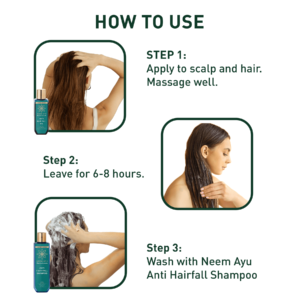
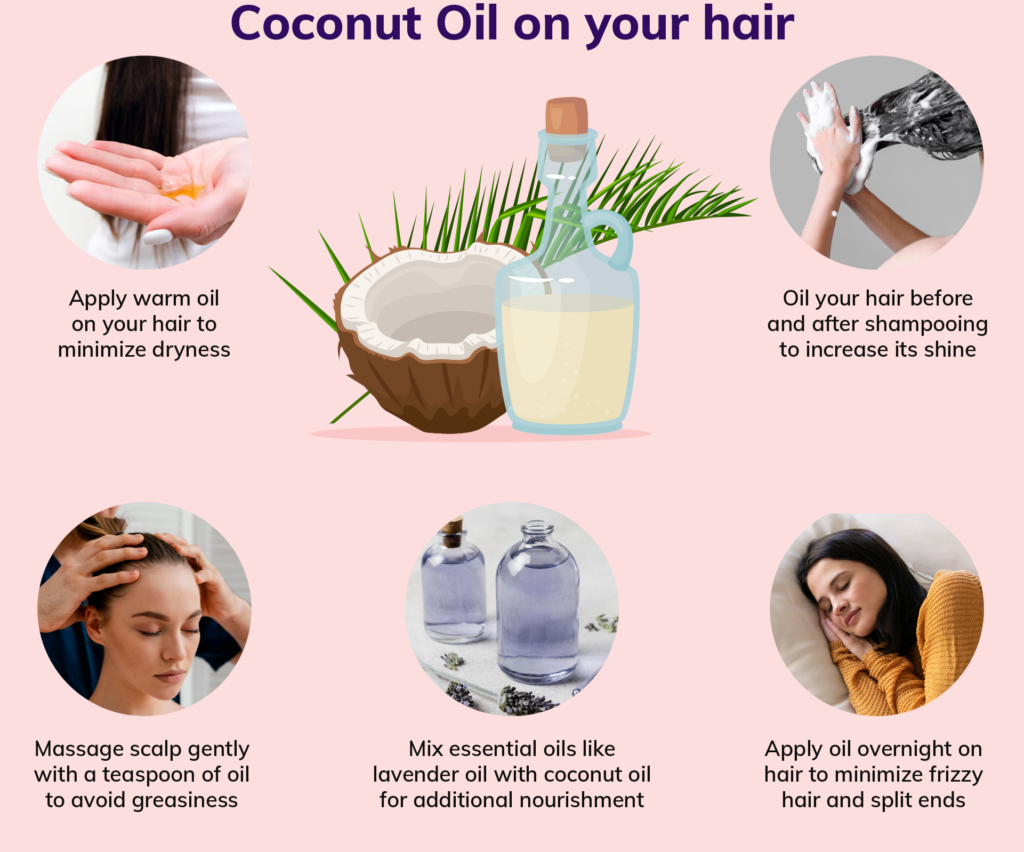

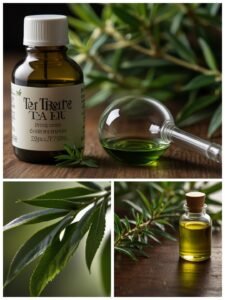

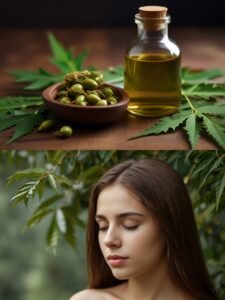






1 thought on “Herbal Solutions for Dandruff”